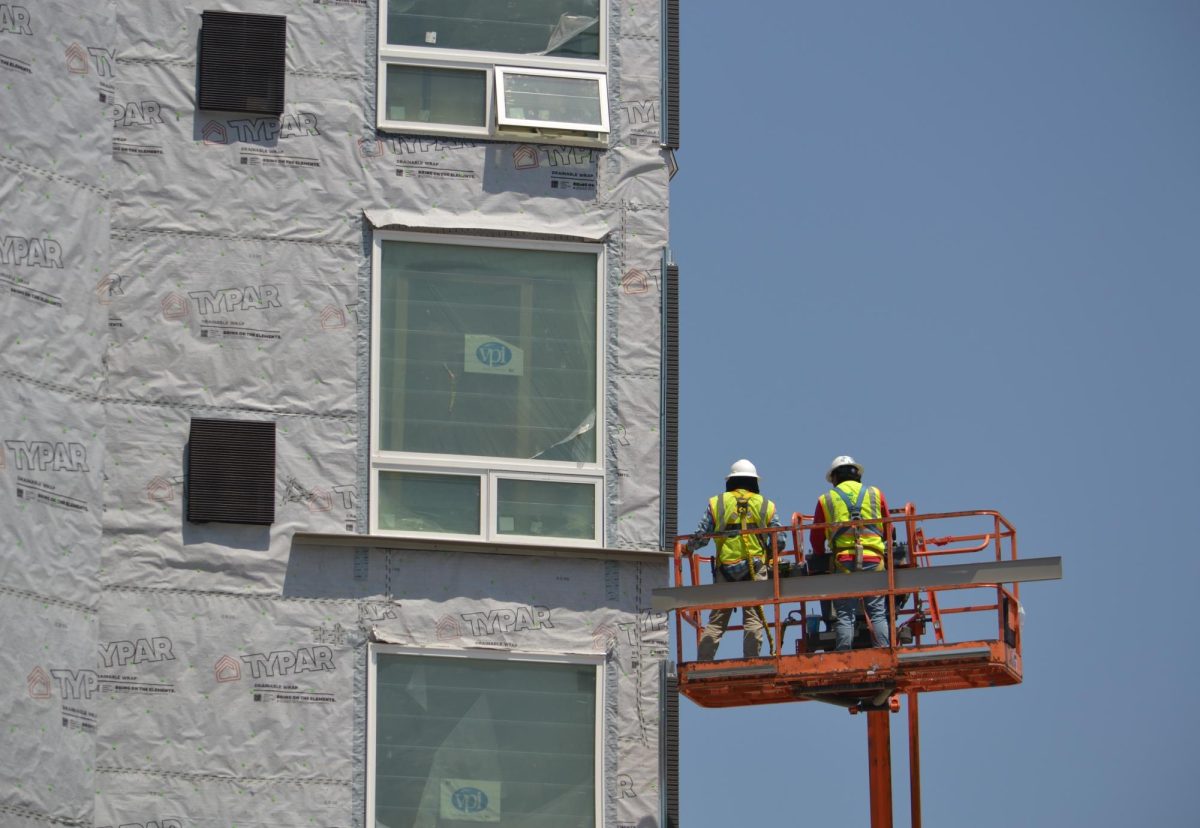The density of Dinkytown is increasing by the day. As someone who cares very much about the growing housing crisis, this is hardly something to complain about. But not all apartment buildings are created equally.
The majority of this new construction was recently covered by city reporter Kate Prom. The Standard and Identity Dinkytown are two of the newest additions joining the ranks of “luxury” student housing that is abundant near the University of Minnesota, such as The Bridges, The Hub, WaHu or The Marshall.
When you sign a lease at any of these structural behemoths, you’re buying into a certain lifestyle. Each one boasts a variety of amenities from community clubhouses to rooftop pools. Not to mention a price tag that reflects these lavish promises.
“Our base rent is $1,250 each,” said Eleanor Wirtz, a student at the University. She lives in a two-bedroom corner apartment on the tenth floor of The Bridges with her best friend. They moved in at the beginning of the 2022 school year and plan to leave next month.
“After we’ve paid our utilities and expenses, it’s $1,538 each,” Wirtz said.That brings the total cost of the apartment to roughly $2,900, plus a monthly charge of $165 that Wirtz pays to park her car in the attached garage.
For a price that steep, surely the facilities are top-notch, right?
“We had to basically beg for an A/C unit and the apartment is all windows. The second the sun starts to shine, it’s like 95 degrees in here,” Wirtz said. “Our washing machine is full of mold, but they have to replace the entire barrel in order to fix it, and I guess they can’t afford that because a lot of other residents are having the same problem.”
Most of the features that would justify the monthly amenity fees are closed and the limited rooms that are available can only be accessed with the help of a front desk staff member. Much of the equipment in the advertised fitness center is broken or unplugged. And the building allows pets, evidenced by the urine-stained carpet that reeks throughout the halls, Wirtz said.
Maintenance requests only go so far.
Even if the building staff is aware of ongoing issues with appliances, they don’t have the authority to actually order the necessary equipment. Management companies are merely the middlemen for their corporate overlords who are pulling the strings in the shadows.
The onus of responsibility for these conditions is typically placed on the hygienically bankrupt lifestyle of college students, who, I think we can all agree, are not always the most ideal tenants.
These operations bank on the high turnover rates of incoming students and the naivety of a vulnerable demographic to shirk responsibility for reported subpar living conditions. It’s no coincidence they each have different branding and offer nearly identical experiences.
To understand the underpinnings of this dynamic, we need a brief recap of how the mega-landlord came to be.
Private equity firms became interested in student housing during the Great Recession in 2008. When the Obama administration bailed out the banks, it gave them the purchasing power to scoop up homes en masse. The Trump administration worsened that effect by bailing them out again at the peak of the financial devastation caused by the COVID-19 pandemic.
These two events changed the landscape of the American rental market forever.
Wall Street landlords often come to us in the form of Real-Estate Investment Trusts (REITs). REITs are companies that own or finance income-producing real estate across a range of property sectors. A more common trend, and the one that is more relevant to the rental market in Dinkytown, includes their much larger, much more powerful counterparts, Private Equity Real-Estate firms (PEREs).
College towns became cash cows for the wealthy, who shoved billions into the student housing industry at the peak of rental shortages.
And before the finance bros come for my head about the miracles of capitalism, private equity firms pledge their allegiance to one thing only: their shareholders. This becomes especially diabolical in the context of housing.
Through a deadly combination of excessive fees, unresponsive management offices and predatory leasing tactics, the experience of the renter quickly becomes collateral damage for the ultimate goal of turning a profit.
One of the largest of these firms, Blackstone, purchased the American Campus Communities REIT portfolio for $12.8 billion in 2022. University Commons was included in that deal.
Another heavy hitter, Greystar, owns The Hub and The Marshall.
The Charleston, South Carolina-based PERE firm brags a record of approximately $32 billion in global development assets and is one of the largest property management companies in the U.S., with over 700,000 managed units in 2022.
The Preiss Company owns The Bridges and The Knoll and is based in Raleigh, North Carolina. The Singapore-based group Mapletree Investments acquired WaHu as part of a $1.6 billion dollar deal.
This is not a complete list.
Many of them are named in the same pending lawsuit and all of them run in the same circle of ultra-wealthy investment tycoons.
Rents are rising while the quality of life deteriorates. Left unchecked, these conglomerates will continue to encroach on the limited housing that is available and the ability to choose an alternative will all but disappear.
If you’ve ever felt like your corporate landlord is detached or vampiric, it’s because they probably are. These complexes are selling luxury lifestyles in name only.
It’s time to wake up and reject Wall Street before it’s too late.
Contact HOME Line for more information on how to hold them to account.






















